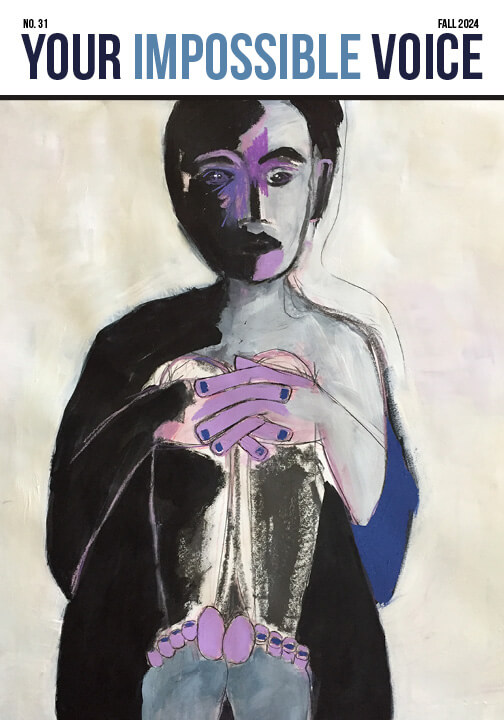Issue 31 | Fall 2024
Rate My Professor: Allen Ginsberg
Arlene Tribbia
Allen Ginsberg, Naropa U.
Class: Poetry
This evaluation is decades late, I know.
Anyway, here goes.
Professor Ginsberg seems to spend a lot of time at the beginning of class trying to get a poetry carpool going to Rocky Flats. Everyone—except for me—seems to know the reason for this mission. A weekend protest? A pop-up poetry vision quest? An off-campus meditation-on-the-landscape to open dormant horizons of our awareness?
It’s a mystery to me.
Maybe it was a dream, but I thought I heard Ginsberg say, We’re going there to hold hands.
I wonder if anyone ever got to Rocky Flats & where the myth of it is & if there’s a big box store built there now.
How do you remember your own mind, your chain of thoughts?
He’s forever encouraging, cajoling & oftentimes commanding students to look around & make lists of their childhood epiphanies, vivid moments from their lives & thoughts that have haunted them over the years. He says memory fragments often make the best poems.
Writing poems was a sacred act to me and Kerouac. We wanted to be angels.
He tries to conjure our holy poetry spirits to rise and for fuck’s sake, just write about what’s right there in front of your face like any devoted Japanese poet might write haiku. Your ordinary mind is extraordinary. You don’t have to go searching for anything special—your perception is unique and what you write will be as well.
So go! Go & gaze up at the sky for a minute or five. Find heaven.
What’s heaven? someone calls out from the back of the class.
Ah! Yes, the heavens, the clouds of babble! One raindrop begins the universe! Let’s focus for now on what’s right in front of us, what’s happening in our mind. Catch our thoughts. Catch grace.
He explains over & over how the first thought is the best thought, but then in a pure trickster move offers us thirteen steps for revising these thoughts to make our poems better.
He exhorts us to be free & yet he demands punctuality. When somebody came to class late one day, he loses it: I’m here on time! He wonders why they can’t make the same simple effort. I won’t be here forever.
But I wonder.
I’m decades late for his class tonight. I’m lucky he doesn’t hold it against me.
It’s winter in Boulder with a supernatural warm snow falling through my dreams, melting small puddles under my dream feet in the classroom.
Sentient beings are numberless, I vow to save them.
His voice, even when he’s pissed at our coming in late, is more of a plea for all of us to respect others. It’s quicksilver dismay though because without losing a beat, he launches back into his lecture & patiently repeats what the late student had missed.
I figure his endless patience might be a result of his meditation practice. He knows in his heart of hearts a kind of equanimity that makes him a real teacher not only in the way he discusses Blake, Yeats or Kerouac, but in the way he teaches students about what’s important by example.
Patience.
Attention.
Listening.
Three keys to unlock a better future for all of us.
Blah, blah, blah. Nobody’s listening.
Not anymore, anyway.
Sometimes, he coughs and coughs. And when he keeps on cough-talking in class, I long to reach through time to hand him a glass of water and a sweet cherry or honey cough drop.
I’m decades late for his class.
You want to be an immortal poet? Write to the future, like Walt Whitman.
Every poet is a descendant of Whitman, so look into the future & get on with it.
Tell your secrets.
He’s generous with sharing his knowledge and his secrets, telling us how he’d sit for hours and hours at his desk writing his dreams, drinking Ovaltine, taking down whatever the muses gave him & fantasizing about this or that.
I’m lazy. I wrote down my fantasies and memories. I got down on my knees and made a vow to save the working class. But I was just a kid. What did I know?
I wonder about his vow and if Ovaltine is still around. What would Ginsberg think of Starbucks, the caramel with sprinkled nuts and whipped cream on top cost of it all and would he care for some assistance from a Cold Brew, a Java Chip Frappuccino, or perhaps the speedy delight from a Dragon Drink, our kindred caffeinated muses for now?
Who knows?
We had notions of heaven.
I wish I could tell him how we have notions of living on other planets now. We have plastic-vitamin-energies distill-constellated with bottled water now. We carry phones in our pockets to get all the news no one reads. We scroll through headlines by the hundreds daily next to dazzling photos from NASA of a mystery we call the solar system revealing millions of galaxies and peer into a revelation of dust and stars and watch as it floats off forgotten into some backmind bucket with all the other news after a few minutes. There are wars. But we all have things on our lists to do. Marijuana is legal now. CBD gummies. He’d like that. We don’t know yet about crypto, how all that will shake out. He’d have a word for that: usury. Probably. Somehow. Most likely. Besides, we all need to understand about how the AIs will soon be arriving fast on unseen winged promises to change our lives. He’d have to wonder: what’s that?
I’m decades late to his class.
The school bells stopped singing years ago once the shootings began and the wildfires bounced everywhere around the planet. But we have hundreds, thousands of different kinds of boxes of breakfast cereals to choose from if we want. In grocery store aisles, movie-cartoon candy cereals come and go.
I wonder if he knows.
He knew how his ideas would cross time. He was prescient enough to know how poems drift through lifetimes. He tells us stories about Sappho’s lines of poetry fragments scattered and crossing through time.
You burn me.
I’m not certain how he does it, but he makes whatever he says become true. Maybe he did alter the molecular composition of humanity.
You only need a handful of lines to change the world.
Who knows?
I got down on my knees and made a vow. What did I know?
Someone said somewhere around Rocky Flats that plutonium triggers were being manufactured for hydrogen bombs. Ginsberg & Peter Orlovsky went and meditated on the train tracks there. To stop the transport of plutonium triggers?
Is plutonium still true?
Who’s going to write love poems to the future?
Is all of this here by some hidden design?
Sentient beings are numberless. I vow to save them.
Did the trigger train ever roll down the tracks while they sat there protesting?
Someone probably knows. I don’t, though.
Someone said that Rocky Flats is a wildlife refuge now, has been since 2007, and so what if the radioactive plutonium buried underground contaminates everything around, and what will happen if a wildfire blows through there—like the Marshall fire almost did?
Who knows? Wait and see. Ask the latest version of ChatGPT.
He says over and over, Breathe.
No one wants to breathe the air from a plutonium wildfire, I want to tell him, but I’m decades late for his class.
He’ll never know about the tiny chemical shards we breathe in and out.
I want to give him five stars. Six. Seven. Eight.
All things are possible now.
I wish I could tell him all about now, how the Supreme Court’s work is to remove and erase whatever it can, probably somehow, even the stars. And how can it be true, but the new president and congress are still up to their old tricks selling the military and missiles to help spread America around the world.
We have too many billionaires busy sneak-spooning endless bowls of sugar-frosted fears and Froot Loops in their Mountain Dew while working on driverless cars, planning futures fitted with air, water, and the padded roads needed for landing this or that all around Mars, and have off-world construction plans to build lunar neighborhoods on the moon while others race to be the first to build-out pin wheeling AIs who don’t breathe, appear indifferent, but willing to give anything a try.
How did he predict the future and know?
Something karmic holds us in its arms & so it goes.
I was just a kid. What did I know?
About the Author
 Arlene Tribbia is a writer and artist who grew up in Chicago. She writes poetry and fiction and makes portraits about otherworldly beings because she’s fond of discovering characters who work to solve the larger cosmic riddles of the universe. Stories of hers have been nominated for the Pushcart Prize and published widely as well as internationally. Her art has been exhibited in unique spaces from dance halls to skyscrapers as well as galleries, including Woman Made in Chicago and the Dunedin Fine Art Center in Florida where Robert Rauschenberg (hero, unseen mentor and influence) also has shown his work. Website: http://arlenetribbia.com/wp/bio/
Arlene Tribbia is a writer and artist who grew up in Chicago. She writes poetry and fiction and makes portraits about otherworldly beings because she’s fond of discovering characters who work to solve the larger cosmic riddles of the universe. Stories of hers have been nominated for the Pushcart Prize and published widely as well as internationally. Her art has been exhibited in unique spaces from dance halls to skyscrapers as well as galleries, including Woman Made in Chicago and the Dunedin Fine Art Center in Florida where Robert Rauschenberg (hero, unseen mentor and influence) also has shown his work. Website: http://arlenetribbia.com/wp/bio/
Prose
Bloodsport: Excerpt from Demons of Eminence Joshua Escobar
Envy Adelheid Duvanel, translated by Tyler Schroeder
Overview Effect Tanya Žilinskas
When I Finally Eat the Cake Sumitra Singam
The Sofa Jean-Luc Raharimanana, translated by Tom Tulloh
Rate My Professor: Allen Ginsberg Arlene Tribbia
EVPs Captured in the Old Fort Addison Zeller
A Short Bob Mehdi M. Kashani
The Weight of Drowned Calla Lilies Katherine Elizabeth Seltzer
Omaha Jane Snyder
The Giraffe Charles O. Smith
Risky Sex Taro Williams
Poetry
Last Week The Sun Died Joanna Theiss
Untitled (Phrenology Box) Kirsten Kaschock
some gifted Gerónimo Sarmiento Cruz
Damn! Steve Castro
Pishtaco Linda Wojtowick
Basket Filler
Rubric
from: The Oyster Ann Pedone
Cover Art
After Time Arlene Tribbia

